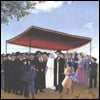Question:
Give me the handle on this Sinai thing. As I got it from Hebrew school, Moses went up the mountain, sat down at his desk and took dictation for forty days and forty nights. G‑d said, "In the beginning..." and that's just what Moses wrote... until he got all the way to the end. Right?
Or did I get it all wrong? Because if I'm right, then I've got a lot of questions. And if I got it wrong, then you're going to have to fill it in, 'cause otherwise, I'm going to sound like a real heretic...
Answer:
The story you got in Hebrew school is basically true, but it's also missing lots of the details. So it ends up coming across as a simplistic Hebrew-School story that only the most gullible believer would swallow. Let's take a closer look at the classical sources (Midrash, Talmud, et al) that describe how Torah got to us.
The Story, According to Us
Before Moses, there were traditions. There were rituals, there were stories, there were ideas. There were writings, as well.1 When did people start writing phonetically? I don't know. There is no way to tell. And some etchings that have managed to endure on the walls of caves in the Sinai are not going to put together a whole history for me.2 But the stories of the patriarchs are obviously very ancient and attest to the linear thinking of a phonetically literate mind. 3 Most likely, Moses had a few scrolls in his possession from more ancient times.
According to Rashi (Exodus 24:4), before Moses went up that mountain, he presented the Jewish people with an official version of the Book of Genesis, as well as part of Exodus—up to the event at which he was standing. I expect he relied heavily on some of those earlier manuscripts for his work, and that he tried to be consistent in style with his additions. That doesn't make this any less a divine work. G‑d can work with editors just as well as He can with authors. (Ask my editor, he'll tell you G‑d actually prefers editors.)
The Ten Commandments scene was a very mystical experience. I haven't read of any vaguely similar experience in any other people's tradition. What happened? A mass of people shared in Moses' experience. They hadn't worked themselves up to Moses' spiritual height, so it wasn't able to last too long. But that was basically the idea: This revelation that G‑d has things He wants us to do and not do, that He cares about what's going on with these little critters down here and here are the basic items—in a few moments, all this became just as real to the people as it was to Moses.
Which makes Moses pretty unique, because he's the only prophet that does such a thing. Others just tell the people, "G‑d says such and such. Trust me." Moses, the populist prophet, says, "Let me tune you in for a minute on what I'm hearing from G‑d." Moses is cool.
Moses then disappears up the mountain for forty days. While there, forty-nine gates of wisdom are open to him, granting him the secrets of all existence. Moses then writes down the experience of Mount Sinai along with a set of rules for a new society, which eventually becomes Parshat Mishpatim—the section written in the Exodus story dealing principally with civil law.
Is everything in Parshat Mishpatim new? I doubt it. Just as I doubt there was anything at all new in the Ten Commandments. The novelty was not the content. It was this idea that the same G‑d who transcends all nature and is responsible for the very ground of existence is really wrapped up in how we live down here. That was revolutionary. It was totally out of synch with so-called enlightened thinking of the times. People thought only little gods could get involved in this kind of thing—and they were easy to bribe. In Egypt, they called that "mata"--something like "karma" to the Hindus. They knew of some essential oneness at the core level of reality—but they thought it preposterous to consider that this G‑d could be engaged in anyone's daily life. Never mind in the daily lives of the masses. Which gave all the more justification to the hierarchy of power and oppression that Moses had stood up against.
Moses the Revolutionary
So Moses was bringing G‑d down to earth. He was demolishing the pyramid of spiritual knowledge that he knew so well from Egypt—and so much despised. He was saying, "This G‑d is so great, He can care about everybody and everything!" Moses was making a revolution.
Why was he making a revolution? Because G‑d was telling him to. To explain that, I would need a long conversation with you about what is G‑d and how G‑d talks to people and why. Maimonides already deals with that quite sufficiently in his Book of Knowledge. Then there is Shaar Ruach HaKodesh of Rabbi Chaim Vital, where he explains that the prophet hears G‑d speaking in his own voice and his own words, (or in the voice of his teacher—as was the case with Samuel). That explains a lot.
I will only supplement by pointing out that when you or I are completely immersed in a subject of Torah and come up with a novel explanation or idea, that is also Torah. Meaning that someone else would not be permitted to study that idea before having said the morning blessing to G‑d for having "given us His Torah." Get that: Giving us His Torah! Even though you or I came up with this idea—and it didn't feel like it landed in our heads from Andromeda 5. Yet it is G‑d's Torah. That's called being one with G‑d. Read chapter five of Tanya.
My point is that really prophecy is not so foreign to human experience as you might think. We all have ideas that pop into our minds from who-knows-where. Just that most people feel they thought of them on their own. A prophet, it seems (I haven't really been there to tell) is one who hears things clearly that others may only pick up with much distortion. He is in tune with that unknowable place from which the Unknown speaks. So he hears it speaking to him with clarity.
Moses was the prophet who got in tune with the very core of reality and heard that speaking to him. That's why he writes in third person, like a passive observer—even of his own life: "And G‑d spoke to Moses saying..." Because, as Nachmanides explains, Moses saw the raw essence as it is, stripped of the filter of his own ego. Other prophets heard the truth as it spoke to them. Moses saw truth as truth knows itself.
Yet he shared that experience with all of us. Which is why Maimonides counts as one of the 13 axioms of Judaism that no other prophet can contradict Moses—because no other prophet has the testimony of the entire Jewish people that, yup, we experienced G‑d talking to him alright.
The Prophecy Thing
Okay, I'll say something else about prophecy—because, after all, this is one of the big stumbling blocks for a lot of people. Especially those who have gotten used to thinking of G‑d in philosopher terms, or maybe Taoist terms as just "that which is." So talking with "that which is" is kind of strange to these people.
The Torah, however, describes the entire reality as nothing more than G‑d speaking. G‑d says, "Let there be photons" and the whole mess starts. Same with everything that exists in our world—all of it is nothing more than a manifestation of G‑d holding a dialog with Himself. That's why, in Biblical Hebrew, there are no words for "thing", "object", "stuff" or even "physical". Everything is called a davar which means simply "word."
Words are crystallizations of thoughts. And that's what holds the world together.
Think about it: Here are all these particles—electrons, protons, negative-charged particles, positive-charged particles, matter, anti-matter, quarks, bosons, blips, bloops, kukaratches, stuff... And what makes them into a world that we can observe and experience? A bunch of rules. Without those rules, those particles can't work together. And without working together, none of them can exist. Turns out that the rules keep them in existence.
And what are the rules? An extremely limited manifestation of G‑d's mind. That's what we call "G‑d speaking."
Next time you wonder why G‑d never speaks to you, look at the world around you. That's all it is: G‑d speaking to you. Just that the signal is so stepped-down and encrypted you can't necessarily tell what He's saying.
So, Rabbi Isaac Luria, the great Kabbalist, explains: all the prophet needs to do is catch those words of G‑d as they are a little less condensed and crystallized, up in a higher world. There things are a lot clearer—less static, more signal. And from there those prophets get an idea of what's coming down—before it actually gets here.4
In Shaarei Kedusha, Rabbi Isaac Luria's protégé, the above-mentioned Rabbi Chaim Vital, goes even further: He claims that prophecy is really the natural state of any human being. You see, when G‑d went about making the first human being, He said, "Let us make Adam."5 The us refers to the entire universe that G‑d had just completed6. The soul of everything from every creature in every world of the entire order of worlds was invested into this being: angels, animals, trees, plants, rocks—the works. The rationale? Adam was to be the conduit of life-giving and existence-sustaining energy traveling from the highest world to the lowest. According to how he leads his life, so will the entire world receive life.
If so, what is the wonder, Rabbi Vital asks, if a human being manages to read some of the data as it travels through him?
Prophecy, it turns out, is just a matter of tuning in to the process of constant creation. Moses' prophecy was a matter of getting to the very core of that process. And so, writes Nachmanides,7 every secret of the universe is contained in the Torah, sometimes in a nuance of a phrase, sometimes in a pattern of letters, sometimes in one of those tiny crowns that is placed above certain letters according to the tradition.8
Forty Years in the Writing
Back to the order of things: So Moses writes down the laws and rules he learns atop the mountain. Short break for the Golden Calf affair. Next thing, Moses is back up the mountain getting some rehabilitative laws, including the details for a portable, people's tabernacle. Over the period of the next thirty-nine years,9 Moses writes at intervals. The writing is done in various ways. Sometimes he writes and then speaks. Sometimes he makes his oratory and then transcribes it. Sometimes he collects together the accounts from a census and organizes it. (This may account for the varied styles we may find in these sections.)
According to another opinion in the Talmud, everything is oral until the last days. According to all opinions, it's not until those last days that Moses gathers everything together and distributes copies to each of the tribes.10 His final instructions: Everyone must write their own. Moses, the ultimate populist.
Convincing Julius
If the whole thing is so plausible, you say, why is it so many of those Biblical criticism dudes won't accept the story? The real question is like this: What would it take to convince those academics? To convince them that:
a) There is a G‑d, responsible for the very ground of existence.
b) This G‑d cares about what's happening in that existence.
c) This G‑d can communicate, and actually does communicate, to human beings all that He would like us to be doing down here.
I propose that all the evidence in the world wouldn't be able to budge those guys one nanometer. Because we are not talking about logic here—we are talking about axioms. And to those academics, it is a foregone conclusion, an axiom, that if not a, then certainly b and c are preposterous.
I don't believe for a moment that any scholar examined the matter objectively, saying, "Let's see, there are two possibilities here: Moses did this because G‑d spoke within him, or people made this up as history went along. Let's examine both and determine which is the more elegant explanation."
Never. When Spinoza began his critique, it was a foregone conclusion that G‑d did not communicate to humankind. G‑d, to Spinoza, is not a being that can care and have concern for His world. Spinoza's G‑d is an object, a passive state of just being. Since Spinoza was the father of biblical criticism, the children could only descend from there.
Julius Wellhausen was fascinated by the idea of history—like every other scholar of his century. History in his day meant Hegel. That's the way everything happened and had to happen: Progressively, through a conflict of social dynamics, thesis-antithesis-synthesis, moving closer and closer to the enlightened modern man. That's the mold of every 19th century thinker, and Torah had to fit into that mold. Tell me that Wellhausen could have accepted anything otherwise.
(Postscript on 5/23/10: Since writing, K.A. Kitchen, one of the foremost scholars of antiquity, published his "On the Reliability of the Old Testament" in which he mercilessly demolishes Wellhausen and his school of biblical critics by presenting the evidence that has since been discovered.)
The fact is, this idea of Moses is so wild, so counter-intuitive, I don't believe anyone could arrive at it through philosophy or logic. Why do we believe it? Because we believe in the Jewish people. That's called Judaism: Belief in Jews. Since we believe in the Jews, we believe in the experience of the Jews, which means we believe in Torah and since we believe in Torah, we believe in G‑d and that G‑d cares. (See How Do We Know We Heard G‑d at Sinai for more on this.)
The Utilitarian Proof
That said, let me point out something that's rarely cited as a proof of Moses' idea, but in my mind wins hands down: It works.
Modern society is grounded lock and barrel on Moses' idea: The idea that all people are created by a single G‑d who cares about each one of them. That is the basis of modern democracy and all civil rights. Because to lay a claim to human rights or equality before the law is ludicrous under any other system. The horrors of the twentieth century proved this better than any textbook could and authors such as George Orwell made it lucidly clear to us: There is no rational basis for human rights or justice for all men.
Yet without these things today, society is simply not sustainable—and neither is life on the planet. If G‑d just is and life just is and everything is therefore without innate meaning or value—then dog-eat-dog with the weapons of modern technology is as ugly—and sure—as can be.
So Moses wins in the end. And if Moses is right that G‑d cares, then what is so impossible that G‑d might wish to communicate exactly what He cares about and that it actually happened at a certain point in time at a certain place to a certain mass of people?
Which is just what I believe.
(Another postscript from 5/23/10: To illustrate what I am talking about in this last section, see Joshua Berman's fascinating article Is the Bible Egalitarian? Better: read his book, Created Equal:: How the Bible Broke with Ancient Political Thought (Oxford University Press, 2008).)








Join the Discussion